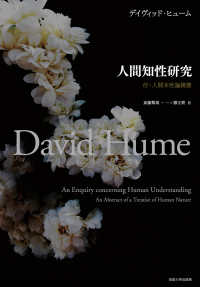- ホーム
- > 洋書
- > 英文書
- > Cinema / Film
Full Description
This book presents a new history of German film from 1980-2010, a period that witnessed rapid transformations, including intensified globalization, a restructured world economy, geopolitical realignment, and technological change, all of which have affected cinema in fundamental ways. Rethinking the conventional periodization of German film history, Baer posits 1980-rather than 1989-as a crucial turning point for German cinema's embrace of a new market orientation and move away from the state-sponsored film culture that characterized both DEFA and the New German Cinema. Reading films from East, West, and post-unification Germany together, Baer argues that contemporary German cinema is characterized most strongly by its origins in and responses to advanced capitalism. Informed by a feminist approach and in dialogue with prominent theories of contemporary film, the book places a special focus on how German films make visible the neoliberal recasting of gender and national identities around the new millennium.
Contents
Acknowledgements
Introduction. Making Neoliberalism Visible
Chapter 1. German Cinema and the Neoliberal Turn: The End of the National-Cultural Film Project
Chapter 2. Producing German Cinema for the World: Global Blockbusters from Location Germany
Chapter 3. From Everyday Life to the Crisis Ordinary: Films of Ordinary Life and the Resonance of DEFA
Chapter 4. Future Feminism: Political Filmmaking and the Resonance of the West German Feminist Film Movement
Chapter 5. The Failing Family: Changing Constellations of Gender, Intimacy, and Genre
Chapter 6. Refiguring National Cinema in Films about Labour, Money, and Debt
Conclusion. German Cinema in the Age of Neoliberalism
Bibliography
Index






